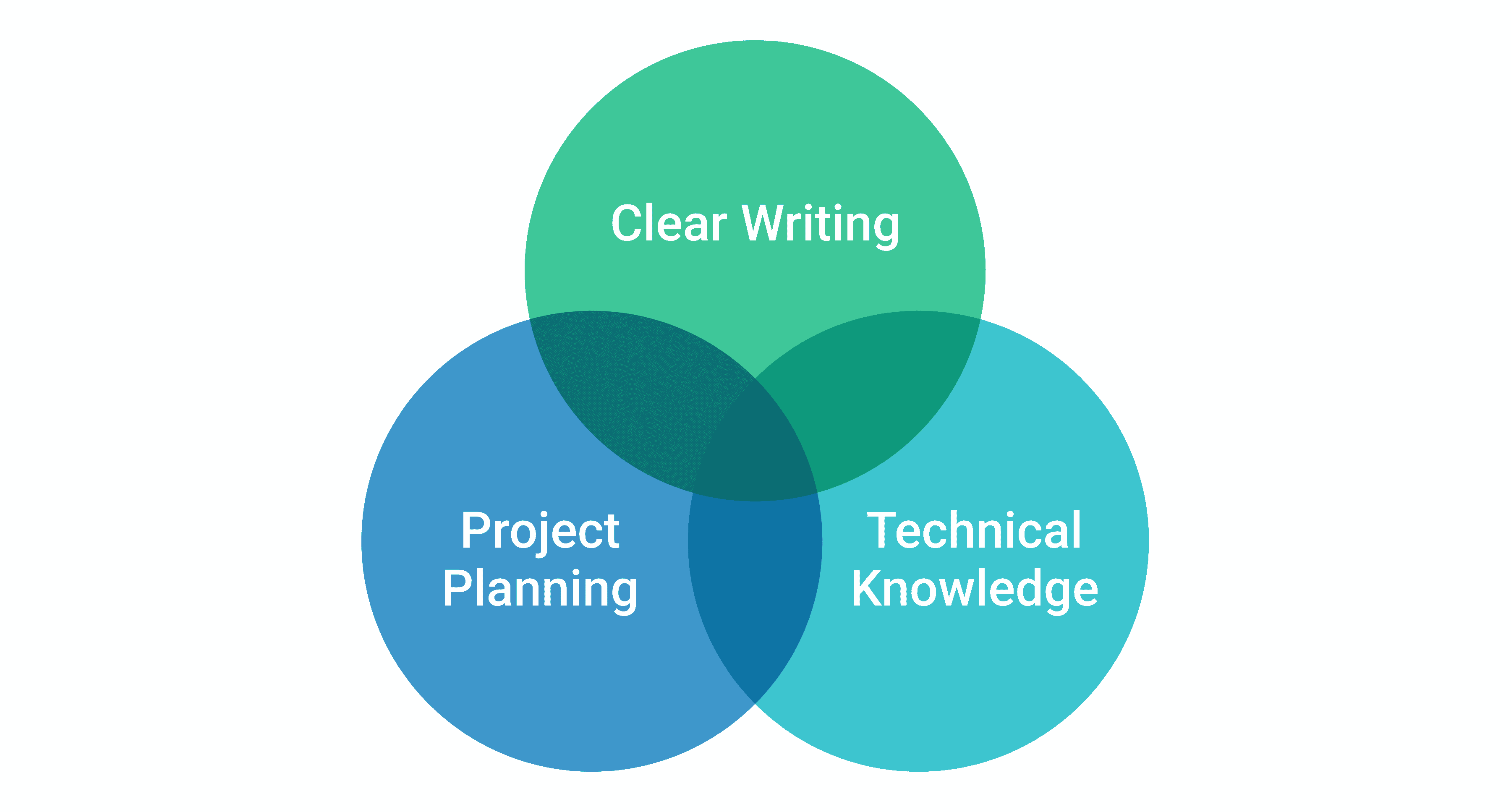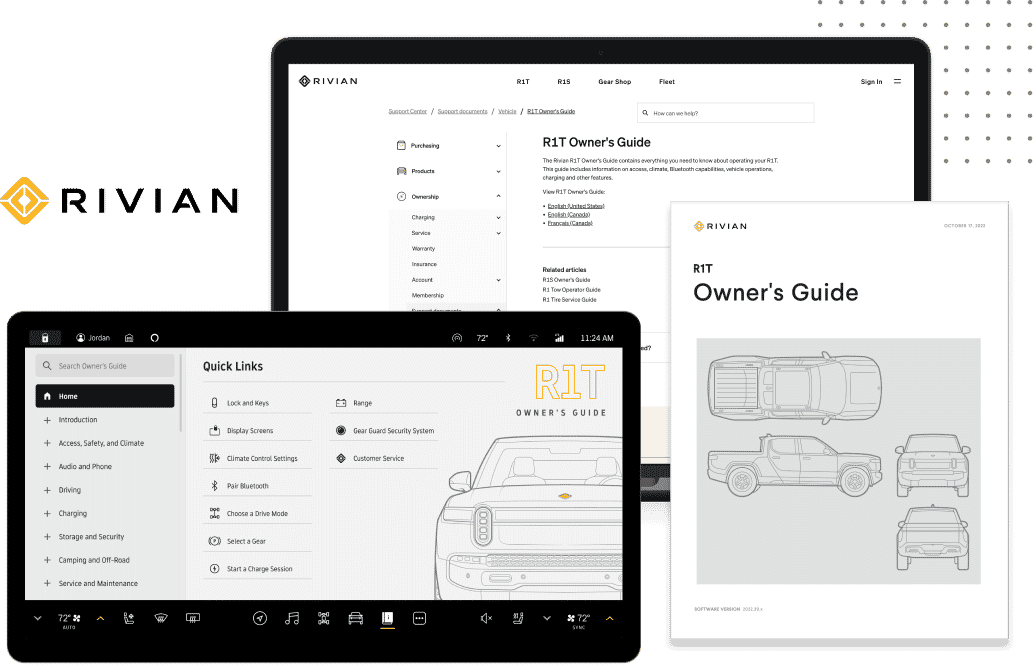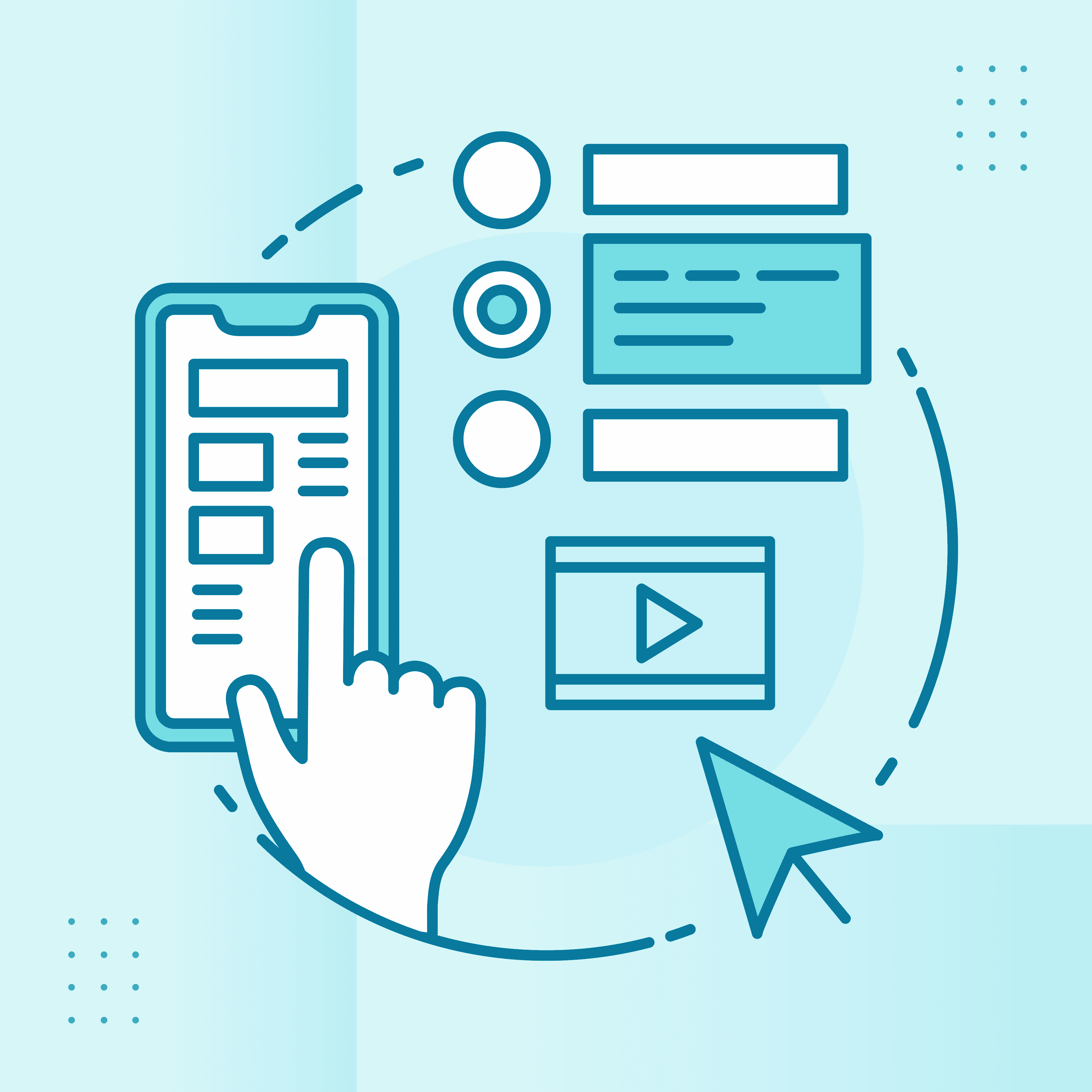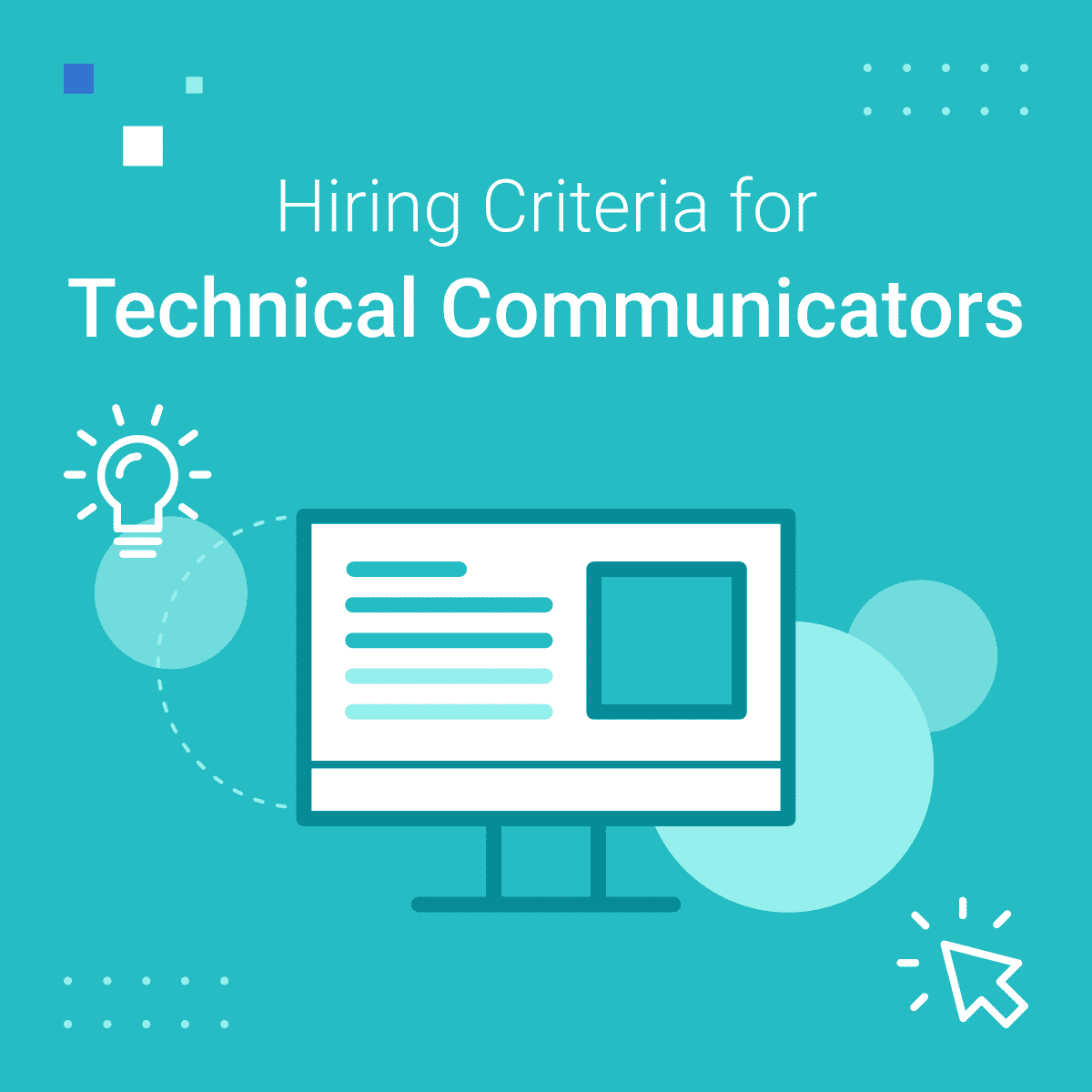This blog post is co-written by Marie Girard, a service design and content specialist who leads B2B organizations in the creation of successful customer experiences. Having worn multiple hats as information architect, enterprise content strategist and senior product manager at IBM, she believes content is core to business architecture and transformation.
The World of Technical Communication
Welcome to the intriguing realm of technical communication, a field that has not only shaped our careers but also our view of professional growth and opportunities. My journey began with a curiosity for technology and an innate passion for writing, leading me to technical writing—a career path that continually evolves with every technological advancement.
Evolution Over Time
Technical communication as a profession has long been involved in translating and transmitting information created by technical experts so that it can be used by end users. Technical writing became increasingly professionalized in the 1990s, spurred by rapid technological advancements and the growing need for clear documentation in industries like software and manufacturing. In the USA, this era saw the rise of professional organizations like the STC and the expansion of specialized education programs. In Europe, the trend varied regionally: Germany emphasized technical communication within its engineering sectors, France saw growth tied to multinational corporations and multilingual documentation, and the UK followed with the expansion of its software industry. By the 2000s, technical writing had solidified as a recognized profession globally, with distinct regional characteristics.
Where Do Technical Writers Come From?
Technical writers often emerge from a rich mosaic of backgrounds—ranging from technical domains like engineering and science to the liberal arts. Our paths converge through a shared drive to simplify complex information and a knack for detail-oriented writing.

Expanding Skill Sets: Adapting and Growing
At the heart of technical writing lies a robust set of core skills—primarily writing and editing. However, the landscape of technical communication demands much more. For instance, a proficiency in programming or video production can be as crucial as foundational writing skills. These capabilities allow technical writers to create more interactive and user-focused content.
Core, Supplementary Skills and previous experience
Previous experience in fields like journalism, software development, or marketing often brings valuable skills to technical writing. For example, journalism hones research and interviewing skills, while software development builds technical expertise crucial for documentation.
Pathways to Technical Writing
|
Previous Experience |
Key Skills/Experiences Brought to Technical Writing |
Common Transition Reason |
|---|---|---|
|
Journalism |
Research, interviewing, clear writing |
Desire for more structured writing, stable industry |
|
Software Development |
Technical expertise, problem-solving |
Interest in documentation, improving user experience |
|
Teaching |
Educational skills, audience awareness |
Shift to less public-facing role, use of pedagogical skills |
|
Marketing Communications |
Persuasive writing, audience analysis |
Move to more technical/product-focused writing |
|
Academia (Researchers, Grad Students) |
In-depth research, complex content simplification |
Transition to industry, practical application of subject expertise |
|
Customer Service/Support |
Product knowledge, communication skills |
Leveraging product expertise in writing, improving information delivery |
|
Editing/Publishing |
Grammar, style, and content organization |
Interest in more technical content and stable career prospects |
|
Engineering |
Technical knowledge, process understanding |
Focus on writing about and improving user documentation |
|
Project Management |
Organizational skills, cross-departmental communication |
Desire to focus on content creation and management |
|
Graphic Design |
Visual communication, layout design |
Combining visual skills with technical content creation |
|
Translation |
Research, clear interpretation, grammar, style, communication skills |
Interest in more technical aspects of writing, more stable career prospects |
Skills Needed to Be a Technical Writer
The foundational skills for a technical writer are as diverse as the career paths that this role can lead to. Essential skills include exceptional writing and grammar, a keen understanding of user experience, and the ability to translate complex technical information into clear, concise text. Moreover, technical skills like understanding software and hardware basics, proficiency in documentation tools, and a grasp of content management systems are increasingly important.
- Analytical: Data Analysis, Technical requirement analysis
- Technical: Programming API documentation
- Communication: Clear and Concise Writing, Structured authoring
- Project Management: Project Planning, Documentation project management
- Design: UX Design, Help system design
- Training: Instructional Design, Training module development
- Problem-solving: Troubleshooting Technical Issues, Software documentation troubleshooting
- Research: Information Gathering, Technical information research
- Leadership: Team Leadership, Documentation team management
- Technological: Content Management Systems (CMS), Specific CMS operations

Transferable Skills: Beyond Technical Writing
Technical writing cultivates a suite of transferable skills that are valuable in many other professions.
These include:
- Analytical skills leading to roles in data analysis or project management.
- Technical skills, which are crucial in fields like software development or technical support.
- Communication skills opening pathways to roles in education, training, and beyond.
Long-term Career Paths: Where Do Technical Writers Go?
After years in the field, technical writers often find themselves in varied roles—some continue to enhance their craft while others move into leadership, consulting, or entrepreneurial endeavors. The key to these transitions is a blend of deep industry knowledge and an expanded skill set that opens doors to new challenges and opportunities. For instance, those with experience in API documentation might transition into developer advocacy, while writers in the life sciences may move into regulatory affairs, where their precise documentation skills are invaluable.
Paths from Technical Writing
The skills developed in technical writing are highly transferable, opening doors to various career opportunities.
|
Skills |
Transferable To |
Common Transition Reason |
|---|---|---|
|
Data Analysis |
Business Analyst, Market Researcher |
Seeking roles with a focus on data-driven decision making |
|
Programming |
Software Developer, IT Analyst |
Desire to implement solutions rather than document them |
|
Clear and Concise Writing |
Editor, Content Strategist, Public Relations Specialist |
Moving towards broader content creation and strategy roles |
|
Project Planning |
Project Manager, Operations Manager |
Utilizing organizational skills in broader management roles |
|
UX Design |
UX/UI Designer, Web Designer |
Interest in the visual and interactive aspects of user experience |
|
Instructional Design |
Corporate Trainer, Educational Consultant |
Passion for teaching and developing educational content |
|
Troubleshooting Technical Issues |
Technical Support Specialist, Quality Assurance Analyst |
Applying technical know-how in problem-solving scenarios |
|
Information Gathering |
Research Analyst, Academic Researcher |
Leveraging research skills in more in-depth analytical roles |
|
Team Leadership |
Team Leader, Management Roles |
Aspiring to lead and manage teams beyond documentation |
|
Content Management Systems (CMS) |
Content Manager, Digital Asset Manager |
Focused on managing digital content and technological solutions |
Emerging Opportunities: The Changing Landscape
The technical communication landscape is witnessing a transformative shift with the integration of AI, agile methodologies, and more user-centric approaches. This evolution is not just about adopting new tools but about understanding and anticipating the needs of diverse audiences, ensuring that information is not only accessible but also engaging.

Career Progression: From Writing to Beyond
Career advancement for technical writers is not linear, it is rich with opportunities for growth into roles that require both specialization and broad, strategic thinking. Initially rooted in writing, many professionals transition into roles like content management, project leadership, or even user experience design, reflecting both personal evolution and industry trends.
New Horizons in Technical Communication
AI has brought a whole new dimension to the science of technical writing. From knowledge graphs to prompt engineering, the future is bright for content creators who keep their skills up to date.
The way we create and deliver content has driven changes in the technology and practices in the field of tech comms.
Human-speak needs to be translated to machine-talk and vice versa.
It is an overblown statement to say, “AI will replace content creators”. AI is unable to generate new content. All GenAI can do is regurgitate already existing content in new ways. Technical writers will add a new skill, “prompt engineering” as opposed to a new job called “Prompt Engineer”.
It can be tempting for organizations to, for example, have engineers write procedures, and then use AI to apply the rules of technical writing, Simplified English, Minimalism, Accessibility, Readability, etc. to make it more user-friendly. Thus, skipping the technical writer altogether. The problem with this approach is while it might work in certain scenarios, you still need tech writers to come up with the rules, refine the rules, perform editorial tasks, define user focus and more. Understanding how humans react to instruction in different settings can only be done by other humans, who then feed the machine. And as we as humans continue to evolve, a static set of rules given to AI at a point in time will need to be updated regularly. Enter stage left: the technical writer.
A Community of Continuous Learners
Technical writing is more than just a job; it's a lifelong journey of learning and adaptation. This community thrives on the constant acquisition of new skills and the seamless integration of emerging technologies, proving that our only constant is change itself.
Both authors of this article are perfect examples that you can come from different jobs and professions into technical writing, and that the world is your mollusk when it comes to career advancement.
“Marie Girard: Technical writing is an incurable virus. Once you have it, it remains in your blood no matter what you end up doing”.
Marie is now a Marketing Manager.
Dipo made the move from technical writing and editing to content creation and is now a Product Marketing Manager.
Marketing writing takes a lot of the skills and disciplines from technical writing, adds sparks to it and allows a lot more creativity than the strict rules and confines of technical content.
Other acquaintances, ex-colleagues have gone on to Product Management, Content strategy, Reiki professionals… Reiki you say! Well, that involves a lot of coaching, which is guiding and giving instructions. Similar to personal coaching and personal improvement, these are all professions where listening, understanding and being able to impart knowledge are key to being successful.
Other names to look up in your research as to where I can go now include: Ann Rockley, Ben Woelk, and Andrea L. Ames (to whom both Marie and Dipo are eternally grateful for her personal coaching, advice and guidance that led us to where we are today).
Evolution Dependent Career Progression
Depending on what industry or what type of technical writing the person has been involved with sometimes has an impact on what profession they evolve into.
The skills developed in technical writing are highly transferable, opening doors to various career opportunities. For example, clear and concise writing skills can lead to roles in content strategy or public relations, while project planning skills can transition into project management or operations roles.
- Regulatory World: "The regulatory world also takes on a lot of ex-technical writers. The rigor on compliance and documentation accuracy makes them ideal candidates for roles in quality assurance, regulatory affairs, and compliance management."
- API Documentation Writers: "API documentation writers generally drift towards roles in developer advocacy or API product management, where their deep understanding of technical communication and developer needs is highly valued."
- Life Sciences: "Tech writers in life sciences have opportunities in regulatory affairs, clinical documentation, and compliance roles, where their expertise in precise documentation is crucial."
- Company Prestige: "The size of the company or industry can significantly influence career advancement. Technical writers coming from established firms like IBM, General Electric, Siemens, or SAP often find themselves with greater leverage in the job market, commanding higher salaries and securing more senior roles due to the prestige and extensive experience associated with these companies."
A Final Word: Overcoming Challenges
A common challenge in technical writing is the "glass ceiling" within the profession. Budgets for technical writing departments are often calculated as a ratio of other departments they depend on, such as engineering or R&D. This can limit the influence and growth potential of technical communication departments within organizations. However, by continuously evolving and adapting to new technologies and methodologies, technical writers can break through these limitations and advance their careers.
Further Reading
- https://comtechp7.hypotheses.org/932
- https://www.vinishgarg.com/we-need-to-revist-the-role-of-chief-content-officer-cco/
- 10 Definitive Steps to Transition from Technical Writer to an Awesome Business Analysis Career
- From Staff Technical Writer to Developer Advocate
- The Role of AI in the Future of Technical Communication: Discover how AI is changing technical communication and what skills will be needed in the future.
- How Technical Writers Transition into Developer Advocacy: Explore why and how technical writers move into technical roles like developer advocacy.












